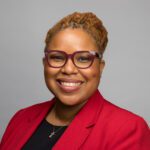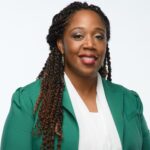Volume 36 Number 3 | June 2022
Deb Rodahl, MBA, MLS(ASCP)CM, ASCLS Today Editor
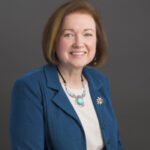
A case in point are the National Pan-Hellenic Council Sororities and Fraternities, of which a number of our ASCLS members are part of. The National Pan-Hellenic Council, Inc., (NPHC) is the coordinating body for nine historically African American fraternities and sororities. It was organized in May 1930 at Howard University in Washington, D.C. The stated purpose of the organization as written in 1930 is, “Unanimity of thought and action, as far as possible, in the conduct of Greek letter collegiate fraternities and sororities, and to consider problems of mutual interest to its member organizations.” Membership in NPHC organizations extends beyond the college experience. Upon initiation, individuals accept a lifetime commitment to the goals and objectives of their respective organizations. Members develop many close bonds and friendships that are often unbreakable and maintained throughout their lives.
What stands out about these ASCLS members is their continued activity with their sorority/fraternity. I reached out to interview some of these members to better understand this connection to community and what ASCLS can learn from them. I challenge you to read about their journeys and not come away totally inspired.
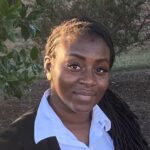
“I found out about my sorority through the women of Zeta that I had met at the University of New Mexico. These women were in positions I wanted to be in, and they took me in wholeheartedly as friends and mentors before I even considered joining the sisterhood. My membership in Zeta Phi Beta helped me find out about so many research internships, volunteer and mentorship opportunities, and social justice efforts. I was able to be put on a path that guided me in the right direction. I hadn’t seen (at the time) any women of Zeta, or many black women, in my field of work, and I knew it was one of my responsibilities to be that representation. Dana Baker, a member of Delta Sigma Theta Sorority, Inc., told me about ASCLS and the opportunities I could have with this organization. Being a new member, I’m hoping to dip my toes in and get involved as much as I can. Hopefully in time I can find the sense of community in ASCLS as I have in Zeta. I would hope for great mentorship opportunities to learn more about my profession as an MLS and to combine that with my master’s in public health as well.”
Dana Powell Baker, MBA, MS, MLS(ASCP)CM, lives in Kansas City, Missouri, and is assistant professor at the University of Kansas Medical Center. She is a member of Delta Sigma Theta Sorority, Inc.
“For as long as I can remember, Delta Sigma Theta Sorority, Inc., was always on my mind. I was drawn to the mission and the community service carried out by the sorority. Additionally, many of the women I grew up admiring were members of this organization, including Shirley Chisholm (of whom I’ve been known to quote), Lena Horne, and Aretha Franklin, to name a few. I appreciated their authenticity, the passion for their work, and their significant contributions in supporting their communities. They were exemplary role models and advocates of using their passion for purpose.
“As I pursue advancement in my professional and academic journey, I am motivated to keep pressing forward regardless of the challenges that come along the way. Oftentimes, I remind myself of those who came before me and left an indelible mark, such as Shirley Chisholm. Her charge of, ‘if they don’t give you a seat at the table, bring a folding chair’ always comes to my mind in moments when I may have self-doubt about career or education choices. However, her words and the influence of those I serve with keeps me inspired to go as far as I can go. Just as there were those who paved the way before me, I recognize that I may be paving a way for those coming behind me. I hope to leave my mark and to empower others coming up the laboratory medicine pathway to do the same, if not more.
“It is so important to be connected to communities on both a professional and personal level. Similar to my involvement with ASCLS, there is so much to gain from being interconnected with other like-minded individuals through my engaged membership. This membership has encouraged me to continue being an active (emphasis on active) member across organizations. In other words, for our organizations to be successful and thrive we need the active engagement of volunteers to help move the needle forward. It takes collaboration and effective teamwork to do the work that supports the mission and vision of the organization. I greatly appreciate how we can come together collectively in pursuit of matters that impact our respective communities. As a member, I feel called upon to be a part of the change we want to see in our schools, our professions, our communities at every level (e.g., locally, nationally, globally). The work we are doing in either space is so much bigger than ourselves … we have the potential to impact other lives in a positive and meaningful way. We cannot be siloed in our thinking and not acknowledge the ripple effect of the work we do.”

“I have been a member of Sigma Gamma Rho Sorority, Inc., since Spring 2018. I joined the Kappa Theta Chapter at the University of Louisiana Monroe (ULM) where we have all but one of the Divine Nine on our campus. Sigma Gamma Rho Sorority, Inc., was founded November 12, 1922, at Butler University in Indianapolis, Indiana, and will be celebrating its centennial this year! After our 100-year anniversary, there will only be one NPHC organization that has yet to reach this feat. The longevity and many other accomplishments prove the council’s relevance in helping our communities. My organization functions at the local, regional, and national level with membership for both graduates, undergraduates, and affiliates. My local, home chapter is the Kappa Theta Chapter, which was chartered October 20, 1986, on the campus of ULM and has been serving and leading for almost 36 years.
“Personally, I was exposed to NPHC long before I joined for myself, but under another sorority. I was a ‘Pearlette,’ or member of the auxiliary group for elementary school girls of Zeta Phi Beta Sorority, Inc., whom my mom had ties to at the time. My love for community service began there. As I got older, I knew members of all other woman NPHC organizations except my own. When I spotted these girls on my campus and saw how sisterly they were (they were always together), I knew I found my fit. I was aware my organization was under the umbrella of NPHC, although growing up I had known it to be the more common name, “Divine Nine.” Of course, I didn’t know all the details, but as you begin your own journey to become a member, you learn your organization’s history as well as basic info of your sister and brother organizations.
“My membership did not necessarily influence my career choices or education, at least not negatively. School always came first, which is something my organization emphasizes. In fact, we were founded by seven schoolteachers. However, my membership did make me more cognizant of how I represent myself, being that usually I am someone’s first introduction to my organization. Sigma Gamma Rho Sorority, Inc., is one of the smaller branches of the NPHC, so you usually see us Sigma women scattered out amongst society. I like to represent well. I know I can’t stand for all of us, but that is a big weight that I carry daily. My membership does make me want to get more involved in ASCLS and even my own local graduate chapter, but my years of leadership in my home chapter have also taught me other important aspects of leadership, like rest, pacing yourself, finding your fit within the organization, and also just being a helping hand without overextending yourself. There’s a balance involved with staying active for years within any organization. I come from a small chapter, so we understand more than ever how it is with few hands trying to make big impacts.
“I believe both my sorority and ASCLS do a great job with trying to cater to its members and the community. During times of crisis, ASCLS checks on those that make up the organization first and then it tries to expand its aid outside. My organization does the same. I think that aspect is always important to ensure our organizations function and are growing.”

“I found out about my sorority from my cousin, who joined before me while I was in middle school. When she came home to visit, I saw the Greek paraphernalia and inquired about it. She informed me about Alpha Kappa Alpha Sorority, Inc., being a sorority that excelled in high ethical and moral standards, effective advocacy, professional and personal development, and social change. I became aware of Alpha Kappa Alpha’s membership in NPHC when I decided to learn the history of the organization before joining. I learned about the Divine Nine and their shared values and goals of their undergraduate and graduate members. Membership in Alpha Kappa Alpha influenced my education because excelling in academics was praised throughout our sorority. We also were required to maintain a minimum GPA in order to stay active while in undergrad. Our advisors and graduate members also encouraged us to excel in all areas while in undergraduate school. Membership has influenced my career choices by providing me with experience and confidence to pursue and take leadership roles in my organization. Taking on roles that others may not be interested in became a challenge that I wanted to conquer.
“Membership in organizations is important in order to learn, grow, and congregate with like-minded individuals to achieve the same goal or mission. Working together with other people in your same interest or field can push everyone to their greatest potential. I feel a strong sense of community with members of my sorority, along with not only ASCLS members, but laboratory professionals as a whole. With my sorority, there are plenty of development opportunities to grow as not only a member of society, but also a member of a sorority whose goal is to give back to others and the community. In membership with ASCLS and other laboratory professionals, development opportunities are also presented that helps me learn more about my career and further my knowledge, and this education helps me became a better laboratory professional overall.”
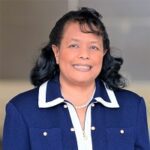
“Alpha Kappa Alpha Sorority, Inc., is an international service organization that was founded on the campus of Howard University in Washington, D.C., in 1908. It is the oldest Greek-letter organization established by African American college-educated women. Alpha Kappa Alpha is comprised of nearly 300,000 members in approximately 1,040 graduate and undergraduate chapters in the United States, the U.S. Virgin Islands, the Bahamas, Bermuda, Canada, Dubai, Germany, Japan, Liberia, and South Korea. Alpha Kappa Alpha is often hailed as ‘America’s premier Greek-letter organization for African American women.’ I have known Alpha Kappa Alpha my entire life. My mother was a member of AKA, as well as many ladies at my church. When I grew up, most of the educators were members of the sorority, and all the black principals were AKAs.
“The National Pan-Hellenic Council is often referred to as the ‘Divine Nine,’ and is a council composed of historically African American fraternities and sororities. On the local level, many cities have Black Pan-Hellenic Councils. I was the chapter representative to the Pan-Hellenic Council for many years.
“The principles of high scholastic and ethical standards is a main purpose for the recruitment of members into the sorority. All undergraduates must maintain at least a C+ average to maintain active membership in the sorority. Undergraduate chapters are recognized for achieving high grade point averages, and grades are submitted to the national organization every semester.
“My leadership skills and preparation developed in the sorority had an impact on my ability to serve the ASCLS organization. I have been a member of Alpha Kappa Alpha for over 50 years. During that time, I have had the opportunity to hold local, state, regional, and national offices. Many of my leadership skills were developed while serving as AKA local chapter president three times, treasurer four times, chair of many committees, and of course parliamentarian. This skillset served as preparation to hold the position of ASCLS-Michigan President, District 2 Director, and Spring Convention general chair.
“I served as the AKA Michigan Cluster Coordinator, which provided the skills to serve as Region IV director for ASCLS. My service on the national level of AKA included the Educational Advancement Foundation, and as fund development chair, whose task was to raise $100 million endowment for the sorority, thus preparing me to serve on the ASCLS Education & Research Fund, Inc., trustee board and Alpha Mu Tau Fraternity Scholarship Committee.
“Alpha Kappa Alpha’s mission is to cultivate and encourage high scholastic and ethical standards, to promote unity and friendship among college women, to study and help alleviate problems concerning girls and women in order to improve their social stature, to maintain a progressive interest in college life, and to be of ‘Service to All Mankind.’ The purpose of Alpha Kappa Alpha is to provide service to all mankind. This focus has a direct impact on my desire to provide service in the area of medical science.”
Stephanie Whitehead, MBA, MPH, MLS (ASCP)CM, lives in San Antonio and is the executive director of Pathology and Laboratory Services at University Health. She is a member of Delta Sigma Theta Sorority, Inc.
“My mother and older brother were both members of the NPHC, so I was able to observe their interactions and experiences during my childhood. In addition, I’m originally from Southern Mississippi. In Mississippi, the NPHC is very active, particularly through the historically black schools/colleges, churches, and other activities (i.e., festivals, etc.). I can clearly recall going to ‘Step Shows’ in huge arenas in Mississippi when I was in high school and being very fascinated with the sisterhood and brotherhood displayed. I was very aware of not just my sorority but all the fraternities and sororities that made up the NPHC. This was mainly through my interaction (in my teen years) with mentors, family members, and older friends but, also, through my own research and interest. Through these interactions, I knew (entering into my undergraduate degree) that I wanted to seek out membership while in college.
“Since its founding (in 1913), over 300,000 women have joined my sorority. Delta Sigma Theta, Inc., is a service organization that promotes academic excellence. Founded by college educated black women, being a member of this sorority inspired me to be passionate about my undergraduate goals and attack my degree with a degree of excellence. Because I was already in my major when I joined, the membership didn’t influence my degree or career choice. However, it did offer me a network of other African American women in STEM and other allied health sciences to network with.
“Delta Sigma Theta is a public service organization that focuses on impacting the challenges of the African American community and, therefore, all communities. Because of my deep involvement and passion for community service, continuing my service leadership in my professional career was a natural transition for me because I had worked so closely with my local community through my sorority. There are several similarities with ASCLS regarding a sense of community:
- DST is dedicated to educating and empowering all communities. DST promotes many programs to address education, health development, and the strengthening of families. This is also the goal and mission of ASCLS as it pertains to laboratory medicine.
- DST was founded by 22 bold and black women who had a strong interest in social issues impacting the African American community and now a variety of public service initiatives. Likewise, the core values of ASCLS include promoting diversity and advocating for quality within the lab.
- DST hosts a variety of mentoring programs (such as Delta Gems) to help educate and assist teenage and young girls in their educational journey. ASCLS also promotes and supports mentorship (professionally) through a mentorship program.
- Like ASCLS, DST is a membership shared between like people who are committed to common goals, a shared purpose and support of a greater vision to improve current processes.”
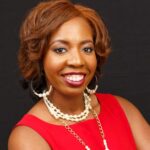
“When I was in high school, my teacher/volleyball coach was a member of Delta Sigma Theta Sorority, Inc. She was also a committee member of the Del-Teens (now called Delta GEMS), the sorority’s high school girl’s empowerment program in which I was involved. I loved what she embodied. She was successful in her career, but she was also involved in the community. Most importantly, she was committed to seeing me succeed. I met other members, and they too embodied those same qualities. I wanted to be like them. No one in my family was in a sorority or fraternity (my grandmother was a part of a ladies’ auxiliary group, and I saw the positive impact of that), but from my early exposure to the members of the sorority, I knew Delta Sigma Theta was an organization that I wanted to be a part of if given the opportunity.
“I went to a Historically Black College and University (HBCU), and most of our sororities and fraternities were part of the NPHC. Membership in Delta Sigma Theta instilled excellence and the need for ongoing professional development. To gain membership in the organization, you must meet specific educational requirements. I have also learned many transferable skills through my membership that has been valuable in my professional role as a technical director. Membership granted me access to many women in various fields, which opened my mind up to the idea that I can do anything I desire to do.
“In the field of laboratory medicine, women of color are often underrepresented. Because of my sorority sister, I had the opportunity to spread my wings outside of the lab, where I took on a role as director of mobile diagnostics to bring mammography services to women where they work and live. I would have never applied for a position like that because I couldn’t check all the boxes on the application, but my sorority sister encouraged me to go for it. I realized I had skills that they didn’t even know they needed. It was a gratifying role that allowed me to impact the lives of women positively, and it gave me the confidence to know that the possibilities are endless.
“Being in a sorority taught me the importance of building a network, serving in my community, and taking on leadership roles inside an organization. Change doesn’t just happen. You must get in and do the work to experience a significant impact. Like the sorority, I knew that I wanted to be a voice in the laboratory community to be able to give back to my profession, empower our members, and lead committees or initiatives to move the needle forward. ASCLS’ mission is important to me and aligned with my own personal core values, making sense for me to align with the organization.”
How Can ASCLS further Amplify our Sense of Community for Members of Color?
- Representation matters. Understanding the needs of the membership and making sure diverse voices are seen across the landscape of the organization, including leadership roles, committees, conference presenters, marketing, and educational materials.
- Provide minority scholarships for undergraduate members. This is especially crucial because of the high rate of minority college students who need to take government financial aid in order to continue their collegiate career.
- Provide mentorship opportunities matching minority mentors to mentees. This can increase the number of minority undergraduate clinical laboratory science students who stick with the undergraduate program. I know personally that post-graduate students of color who came back to talk with me and others helped me to see that my future career will be attainable.
- Highlight more up-and-coming, smaller initiatives that people are starting. A lot of people of color are getting into things like community gardens and other projects that can impact us for generations to come, but because they don’t have the funding and/or spotlight, it is hard for them to get traction.
- All members should be given an opportunity to serve and encouraged to participate on committees and boards. It starts with just asking for participation, providing training, mentorship, and support.
- Stay current on diversity research, legal/regulatory activities, and social trends affecting the entire laboratory community.
- Provide education and more specific training to help employees identify and respond to the unique needs of cultural situations.
- Share individual experience and expertise, serving as a resource to the lab community to remove barriers.
- Understanding that there are unique challenges that face members of color and taking an active interest in those causes as it relates to the medical laboratory.
“In summary, we hope ASCLS will continue to ‘be an awesome ally’ in uplifting and celebrating its members from diverse backgrounds. Diversity is our strength, and professional organizations, such as ASCLS, should continue to amplify the voices of its members. Providing opportunities to tell our stories in publications, such as ASCLS Today, is vitally important to share our experiences and to build a sense of belonging in our community. In doing so, it allows for other members to learn more about our lived experiences and about our service in other areas.”
As a final comment, this group wanted to make sure we made mention of Cheryl A. Hickmon, who embodied leadership in both her commitment to her beloved sorority and the laboratory profession. As the 27th national president of Delta Sigma Theta Sorority, Inc., she led this service-based sorority, representing more than 300,000 members worldwide. She dedicated 39 years of continuous service to the sorority in addition to her over 30 years of work as a licensed clinical laboratory technologist. Her impactful work as a leader transcended into her role as a supervisor in the reproductive medical laboratory at Montefiore’s Institute for Reproductive Medicine and Health. It is because of laboratorians like her, women of color can look to her legacy and know it is possible to make an impact not solely within our profession but on center stage to our global community, too.
Deb Rodahl is retired but formerly was Vice-President of Hospital Operations at St. Joseph’s Hospital in St. Paul, Minnesota.
